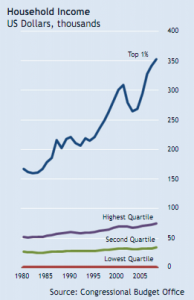ACCLAIMED historian Howard Zinn once boldly proclaimed that “democracy doesn’t come from the top, it comes from the bottom.” Indeed every generation has struggled ceaselessly against the overwhelming tides of illegitimate authority. From the Hebrews fleeing slavery in Egypt, to women demanding suffrage in recent times, common goals of freedom and democracy have been hard won.
The torch of liberty has been passed to this generation, and the clash of the powerless with the powerful has manifested in the form of the Occupy movement. This strange phenomenon has been misunderstood and misanalysed by a hostile and condescending corporate media on the one hand, and overly optimistic leftist intellectuals on the other. The fact is that the Occupy protesters know what they are protesting, but are nonetheless unable to articulate a cogent alternative.
Their fight is against an international menace that has permeated societies, breaking apart families, destroying the working class, and poisoning the environment: institutionalised economic injustice. Corrupt organisations, mostly corporations and governments, have tainted the democratic process with lobbying, profligate bailouts, and foreign wars that are perceived to benefit predominantly the wealthy.
Business of the State
This link between the business class and the state is not new. An implicit understanding between business and political interests built the U.S. economy itself. Founding Father Alexander Hamilton implemented a system of tariffs and subsidies to aid American manufacturing. The U.S. military massacred Native Americans to clear the land for railway tycoons. And the original U.S. Constitution condoned slavery, much to the delight of Southern cotton farmers.
In this sense, the Occupy movement is long overdue. The richest 1% of Americans now control 40% of the wealth. Over the past thirty years real wages have stagnated while top incomes have risen, as the rich steadily steal productivity gains from the working class. The United States’ income inequality now parallels that of totalitarian Iran and oligarchic Russia. A few miles from the White House, one can find Washington D.C.’s poorest districts, while in St. Petersburg, the penurious live in the shadows of the prosperous; there are no in-betweens. Is it any wonder then that the rage simmering beneath the surface has now exploded into a cacophony of sound and fury?
This is perhaps why, to shallow observers, the Occupy movement appears inchoate in its aims. A walk through Occupy London, for instance, reveals a potpourri of causes: socialism and anarchism, environmentalism, pacifism, animal rights. There appears no semblance of commonality. Regardless, a careful observer realises that economic injustice underlies many of these societal ills. After all, in modern democracies, the affluent have more political power than the impoverished, where the former maniacally twist the instruments of dominance towards their own designs against the latter.
That, then, is the problem. The solution is much more difficult to articulate. Some occupiers endorse greater government largesse, others demand an end to bailouts, and still others seek to abolish the state altogether. Cries for “socialism” occasionally ring out among the troubled masses, but there is no agreement over how to break the cabal that bankers and politicians have established.
The Occupy protesters would rejoin by drawing attention to their particular brand of direct democracy, the general assemblies, whereby key decisions are discussed – anyone is theoretically allowed to speak – and then put to a vote. This experiment in consensus decision-making is just that: an experiment that is unlikely to be adopted by society-at-large. Besides, it is not even that democratic; assembly facilitators can steer conversations as they please.
Engaging Ideas
Is there any truth then to the media’s caricature of protesters as dim-witted ideologues keen on marijuana and two-cent philosophy? Perhaps, but at least occupiers have, finally, engaged the public in dialogue about the intrinsic links between state and corporate avarice. The first step towards recovery is identifying the problem.
But now protesters must focus on recovery itself. Socialism is probably not the answer; the class war has already been won by the capitalists. Voters can seek only to make our current system more fair and equitable. Some elements of the Occupy movement made broadly reasonable demands; an end to corporate welfare programs and hazardous public sector cuts, for instance. They could also have demanded better financial regulation, tighter limits on corporate lobbying, and a return to the Bretton Woods international monetary system. In short, protesters should call on governments to restore the financial system to its original purpose of lubricating the economy, not destroying it.
Still, the light of liberty flickers on from Cairo to New York.





